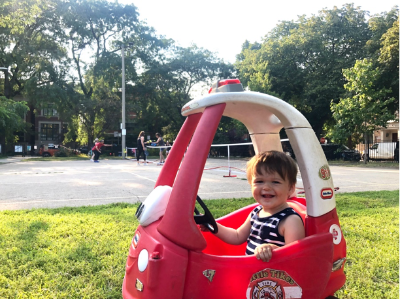1950 sitcoms and the horrors of pickleball
Nearly 10 years ago, I moved into an idyllic neighborhood.
It’s like a scene from a 1950’s sitcom.
Neighborhood kids come over and knock on our door to ask if Fiona, our 5 year old, wants to ride bikes.
There is a local park that is the communal area for the neighborhood.
If you walked by there on any night during the summer, you would see dads standing in one corner talking about neighborhood politics and complaining about the noise from the pickleball courts, which has elicited dozens of comments on local email chains.
My son Peter, aka ‘Rocky,’ outwardly smiling, but inwardly his rage against those pickleballers is intense.
Moms swap stories of trips, kids’ schools and parent frustrations.
All this while swarms of kids run around the park, laughing and playing.
It’s a Norman Rockwell painting.
Meanwhile, our home is walking distance to a world-class zoo, the beaches of Lake Michigan and I run the three miles into my office every day.
This is not a suburban utopia. I live in the city of Chicago.
But you never hear about this side of Chicago. Instead, discussions of crime and safety get sensationalized.
That’s not to say crime isn’t happening. It is. When you have a population of nearly 3 million people, there will be crime.
But there is not much crime where I live. In fact, when I asked my neighbors if they lock their doors at night, most answer, “Not regularly.”
This is weird, or at least I thought it was weird.
It turns out that Alexis De Tocqueville saw a similar trend nearly 200 years ago.
He saw in America that communities thrived when they had strong “mediating institutions.” Those are groups of people who come together to fix problems and act outside of government and private industry:
“Americans of all ages, all conditions, all minds constantly unite. Not only do they have commercial and industrial associations in which all take part, but they also have a thousand other kinds: religious, moral, grave, futile, very general and very particular, immense and very small;
“Americans use associations to give fêtes, to found seminaries, to build inns, to raise churches, to distribute books, to send missionaries to the antipodes; in this manner they create hospitals, prisons, schools. Finally, if it is a question of bringing to light a truth or developing a sentiment with the support of a great example, they associate.”
This is what is happening at our neighborhood park. The community is coming together and addressing solutions to problems.
And it’s become so successful that pickleball noise is our top concern.
It sounds ridiculous, but if you can’t play pickleball without the neighborhood coming down on you, what would happen if there were a drug deal, or a robbery?
It’s made me realize, maybe this is what we are missing in a lot of Illinois today.
Church attendance has dwindled. Civic organizations, such as the Elks, the Moose and the Optimists, are seeing decreasing membership. And as Robert Putnam has pointed out, even bowling leagues are becoming extinct.
For the American experiment to thrive, we need more mediating institutions: more little league teams, more inner-city scout troops and as much as I hate to say it, even more pickleball.
These institutions bind us together as a people. And when they do, more people can leave their doors unlocked – even in “dangerous” places such as Chicago.




